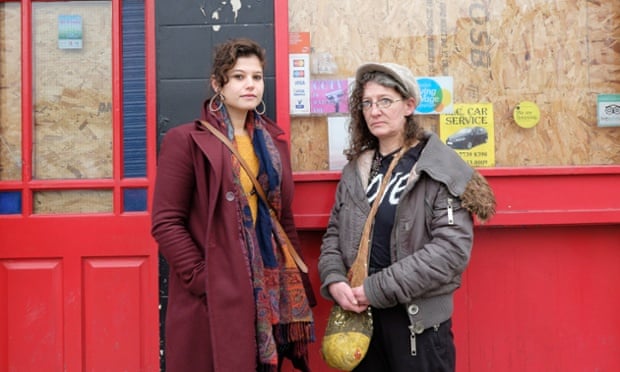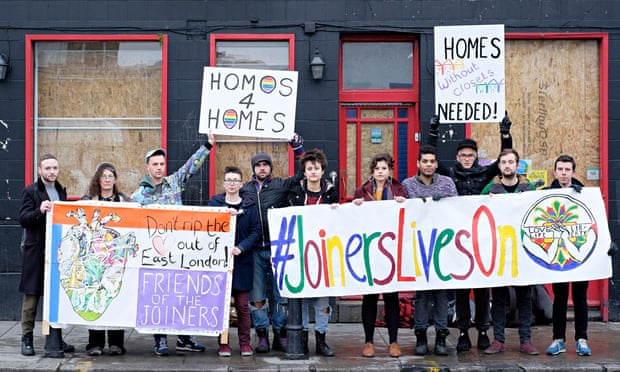
LGBT venues are being lost and with them gay and lesbian heritage, but do cultural shifts also play a part in this trend?
|
LGBT venues are being lost and with them gay and lesbian heritage, but do cultural shifts also play a part in this trend?

Historically, the gay scene has been a moveable feast. Pubs, bars and clubs spring up in one area, thrive for a while and then fade away, only to pop up somewhere else. But the past couple of years have been notably hard for lesbian, gay, bisexual and trans (LGBT) venues in the UK. In the capital alone, more than a dozen spaces have closed, from Vauxhall superclub Area in south London, to local pubs north of the river Thames, to lesbian institution Candy Bar in Soho and Madame Jojo’s, home to many queer nights. The future of four or five more hangs in the balance, and outside London, cities such as Brighton and Manchester are also suffering.
“There does seem to be a closure epidemic at the moment,” says Tony Butchart-Kelly of the Albert Kennedy Trust, a charity that works with at-risk LGBT youth. He sees it as a worrying development because bars and clubs aren’t just places to party but crucial sites of community and belonging. “Young people look to these as safe places where they can feel accepted, especially if they’ve been rejected by their families. For most people, it’s the first time they’ve been surrounded by LGBT people.”
Cliff Joannou, who edits London gay listings magazine QX, estimates that 25% of LGBT venues have closed in the capital since the recession. “And the gay community is small. Losing four or five in the space of a year is a big impact. And the more places that are threatened, the harder it is to maintain community – especially when whole locations are being lost. The sense of Soho as a gay village or Vauxhall as a gay village is going,” he says. “It’s like losing the Asian community from Brick Lane.”
The commercial gay bar and pub sector boomed in the 1990s. Some continue to thrive. Some were bought by corporate breweries that turned them into straight venues. Others were hit by the recession. Now the soaring London property market makes many sites vulnerable to commercial and residential redevelopment when leases end.
“Every part of London has a pound sign on it now,” says Joannou. “Take The Yard in Soho – a unique space with such character. But the owner can put a chain restaurant and a couple of floors of flats in there and make a lot more money.” Westminster council is deciding whether to approve planning permission for just such a scheme, while Camden council considers another application that would convert the upper bar of The Black Cap – where drag acts such as Danny La Rue and Hinge and Bracket started their careers – into flats. The Royal Vauxhall Tavern has been bought by a property developer whose plans remain unclear.
“It’s not a homophobic issue,” Joannou says. “It’s independent venues versus big business.” Planning procedures often privilege big corporate ventures, and give weight to residential concerns such as noise levels, even if these relate to new homes built in long-established entertainment districts.
“It’s making things impossible for independent businesses,” says Chris Amos, whose venue Manbar on Charing Cross Road closed recently following a dispute over noise levels. “I think they’re trying to do what they did in New York and homogenise the tourist centre. There’s more money in property than having gays in there drinking.”
But insisting that gay bars are good and property development bad might be oversimplifying things. “We shouldn’t just give in to the market, but nor can we hang on to a model of gay bars from the 90s, because that might not be what we need now,” says Matt Cook, senior lecturer in history and gender studies at Birkbeck College, University of London, and author of A Gay History of Britain.
“Pubs and bars have been very important in shaping ideas of community and identity, but they’ve rarely been motivated by purely altruistic impulses. Property prices and the profit motive are not a new consideration in gay bars.”
As well as economics, cultural and demographic shifts mean that the mainstream is less prejudiced than it used to be, leaving some LGBT people happy to socialise in mixed environments or via the internet and mobile apps. Many LGBT students in Brighton, for example, appear to be less enamoured of the bar scene than older LGBT people.
In Brighton, for example, where house prices have risen steeply new LGBT homeowners often work and socialise in London, leaving the city’s gay bars struggling – not least because, at the same time, the traditional annual influx of gay students is drying up.“There’s a gay pub crawl as part of the freshers’ fair. In the past, you might have expected 800 people to take part. This year it was maybe 100,” says James Ledward, editor of Brighton gay listings magazine GScene. “Now people can feel comfortable in their local bar, so the traditional gay venues are having a bit of an identity crisis.”
In Manchester, local institutions Taurus and Eden have recently closed their doors, perhaps forever, and a sense of vulnerability is in the air. According to local gay business leader Jackie Crozier, “Manchester’s student population often prefer to drink at home as opposed to bars to save on money, so whilst many of the clubs don’t suffer, the bars which close earlier do.”
Amos says: “It’s hard to put a business plan together now where your primary market is focused on gays. If people do want those venues, they have to go there and use them.” He is opening a new restaurant-bar-performance space in Southwark, called Atmos, but describes it as “gay-friendly” rather than as an LGBT venue.
Still, the appeal of the old-school gay bar may be more robust than it seems. “People still want gay venues to socialise in,” says Butchart-Kelly, who is 31. “I still feel uncomfortable holding a boyfriend’s hand or kissing him goodbye in predominantly straight places.”
And this applies to younger LGBT people as well. Travon Steadman is a 20-year-old student and Black Cap regular. “As a young gay boy, I still feel the need to connect with other people who understand where I’m coming from,” he says.
“It’s important to have a designated area – it’s about being validated and told you’re OK, and it’s about a community feel. You can end up talking to a gay man in his 60s and learn so much about gay history and culture. It’s like your nan passing on wisdom. We take advantage of the fact we can walk around and be gay, but too often we don’t know our history. Knowing your history, knowing your movement, gives you power.”
Perhaps what is vital isn’t access to pubs or bars per se but to places where LGBT people can socialise and build community. “What can result from this kind of thing [multiple venue closures] is more community-based reactions,” says Cook, “from squatters’ groups to people organising film nights or reading groups at home. Physical spaces are absolutely crucial, but they don’t only need to be bars.” Brighton seems to bear this out – even as the bar scene struggles, the city’s annual Pride event goes from strength to strength and gay choirs and sports clubs attract hundreds of members.
But the rate at which existing venues are closing remains a concern given how few new spaces are taking their place. “We know LGBT people, especially young LGBT people, have higher incidence of depression, self-harming and suicide,” says Butchart-Kelly. “Isolation is a major source of stress, and if you remove the ability to socialise, it’s a real issue.” The problem is made all the more acute by the closure of many youth groups and outreach projects in the wake of funding cuts. “I think it’s disgusting,” says Steadman. “It’s going to make us feel more lost.”
The idea that this could be the end of an era makes for a sobering start to LGBT History Month, which runs throughout February.
Yet Joannou takes strength from the past. He says: “The gay scene has always found new ways to move with the times. Before decriminalisation, people found safe spaces to congregate – that’s how we survived for decades when it was illegal to be yourself. When times are hard, we come together and find new places.
When the Joiners Arms opened as a venue for all sexualities in May 1997, Jane Clendon was among the first regulars. “The difference was the friendliness I found there, and the diversity,” she says. “You could go on your own and talk to people you wouldn’t meet otherwise.”
The Joiners became an east London landmark, known for wild nights and good turns, such as helping fund treatment for asylum seekers with HIV. But in November, the pub on Hackney Road announced its closure: the site was earmarked for high-end property development.
Regulars created a group, The Joiners Lives On. “The idea was not only to save the Joiners but to create an inclusive community centre,” says Clendon. “Places for people to socialise are dropping like flies. People say there’s no need for gay places now that we can get married but all the old issues are still there.” Last year, 19 UK police forces reported a rise in homophobic attacks.
“Queer people still can’t go where they please and act how they want,” says fellow group member Charlotte Gerada. “You need spaces where people don’t have to worry about who they kiss or how they look.”
The Joiners Lives On swiftly secured asset of community value status for the pub – a local council designation that makes it harder to change a venue’s use and means it can’t be sold without giving the group the chance to bid for it themselves. They were too late to save the pub as it was – it closed last month - but they have not given up.
“As the developers are only at the pre-planning stage, we want to meet and discuss options for saving and evolving The Joiners Arms,” says Gerada. “It is our vision to create a co-operatively run queer community centre and bar space.”
The campaign established links with other threatened LGBT venues, and groups resisting redevelopment such as Save Soho and the New Era estate’s E15 Mums. “There’s a whole movement going on now,” Clendon says. “It shows the level of anger at what’s happening and surprise at how fast things are changing. But it is worth fighting. Together is the key.”